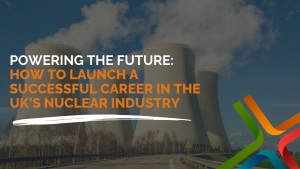How Engineering Companies Can Become Age-Inclusive and Future-Proof Their Workforce
In a significant step forward, we've proudly signed the Age-Friendly Employer Pledge with the Centre for Ageing Better. This commitment marks more than just a pledge - it's a promise to shape workplaces where professionals of all ages, particularly those aged 50 and over, can thrive and contribute meaningfully.
Engineering firms, long driven by innovation and progress, must now turn their focus to one of the most transformative shifts in the labour market: age diversity.
Why Age Inclusivity Matters in Engineering
By 2030, 50% of UK adults will be aged 50 or over, a seismic demographic shift that requires a rethinking of recruitment and retention strategies. Engineering, like many sectors, faces a talent shortage, and overlooking older professionals only exacerbates the problem.
Traditional perceptions often view ageing as a decline in potential. But the reality is that experienced professionals bring valuable skills, mentorship capabilities, and deep institutional knowledge.
1. Adopt Age-Inclusive Recruitment Practices
To build an age-diverse engineering workforce, start at the source: hiring.
- Write inclusive job descriptions: Avoid language like “young and dynamic” or “recent graduate preferred.” Instead, focus on skills and competencies.
- Advertise roles on platforms targeted at over-50s: Partner with organisations that specialise in older workers, like Rest Less or Age Diversity Network.
- Use age-blind application processes: Mask dates of graduation and early employment history to reduce unconscious bias.
2. Leverage the Experience of Older Engineers
Many engineering firms focus on early-career development but overlook the benefits of retaining and empowering seasoned professionals.
- Create mentorship programs where older engineers share knowledge with younger colleagues.
- Offer project leadership roles to senior professionals, tapping into their expertise without the intensity of hands-on design work.
- Recognise achievements and contributions of older staff through internal awards or spotlights.
Dis you know? Age-inclusive companies often see greater knowledge retention and fewer costly errors due to experienced oversight.
3. Provide Flexible Work Options
Older employees may have different lifestyle needs. Offering flexible work arrangements is a key factor in retention and engagement.
- Part-time roles, consultancy contracts, or phased retirement plans enable experienced professionals to stay in the workforce longer.
- Invest in ergonomic assessments and adaptive tech for workers who may have specific physical requirements.
Did you know? Research shows that flexible work policies can boost retention by up to 20% among older workers.
4. Rethink Workforce Planning
Engineering firms must plan for the future by building age diversity into their talent strategy.
- Conduct age audits to understand workforce demographics and plan for succession.
- Align your diversity and inclusion policies with age-friendly goals.
- Include age as a key pillar in your DEI strategy, not just a footnote.
Future-proofing engineering firms means acknowledging that a multigenerational workforce drives innovation and resilience.
5. Promote a Culture That Celebrates Age
Age-friendly workplaces thrive when there's a cultural commitment at every level.
- Train hiring managers and leaders to recognise and eliminate age bias.
- Share internal success stories of employees over 50 to reshape narratives.
- Encourage intergenerational collaboration through team-building and project pairing.
A company culture that values every stage of life is one that retains its best talent longer—and performs better as a result.
Our Mission
As engineering evolves to meet the challenges of tomorrow, age inclusivity isn't just ethical – It's essential. At Alexander Associates, our Talent Advisory services help engineering firms navigate the changing landscape with strategies that build resilient, diverse, and future-ready teams.
By embracing older professionals, you're not only addressing talent gaps – You're enriching your organisation with depth, wisdom, and long-term sustainability.
Contact us today to learn how your business can become a leader in age-inclusive workforce planning.
01959 562 572
Powering the Future: How to Launch a Successful Career in the UK’s Nuclear Industry
The UK's nuclear industry is experiencing a significant resurgence, presenting a wealth of opportunities for those eager to embark on a career in this dynamic sector. With the government's commitment to expanding nuclear capacity to 24 GW by 2050, the industry is poised for substantial growth, necessitating a skilled and diverse workforce.
Understanding the UK's Nuclear Landscape
As of 2024, the civil nuclear sector in the UK employs approximately 86,908 individuals, marking a 60% increase over the past decade. This surge is largely attributed to major projects like Hinkley Point C and Sizewell C, which have significantly boosted employment in regions such as the South West and North West of England.
Diverse Career Paths in Nuclear Energy
The nuclear industry offers a broad spectrum of career opportunities across various disciplines:
- Engineering: Roles include nuclear, mechanical, electrical, and civil engineering, focusing on the design, maintenance, and decommissioning of nuclear facilities.
- Project Management: Professionals oversee the planning and execution of nuclear projects, ensuring they adhere to safety standards and timelines.
- Safety and Environmental Management: Specialists ensure compliance with environmental regulations and the safe handling of nuclear materials.
- Research and Development: Scientists and engineers engage in innovative projects, such as developing Small Modular Reactors (SMRs) and advancing nuclear fusion technologies.
Competitive Salaries in the Nuclear Industry
A career in the nuclear sector is not only rewarding but also financially attractive. According to industry data, the average salary in the UK nuclear sector is around £50,000 per year, significantly higher than the average salary in general engineering, which is approximately £38,000 per year. Senior engineers and project managers in the nuclear industry can earn upwards of £70,000 to £100,000 per year, particularly in high-demand roles such as nuclear safety and regulatory compliance.
Moreover, apprenticeships and graduate programs in nuclear tend to offer competitive starting salaries, often ranging from £27,000 to £35,000, which is higher than many other engineering graduate roles. This makes nuclear a financially stable and lucrative career choice compared to other engineering disciplines.
Pathways into the Nuclear Sector
- Apprenticeships: Ideal for those seeking hands-on experience while earning qualifications. Organisations like the National College for Nuclear offer apprenticeships in science, engineering, project management, and business administration.
- Graduate Schemes: Many leading companies, including EDF Energy and Rolls-Royce, provide structured graduate programs that offer comprehensive training and development opportunities.
- Specialised Courses: Pursuing degrees or certifications in nuclear engineering, physics, or related fields can enhance your prospects. Institutions like the University of Birmingham offer postgraduate courses tailored to the nuclear industry.
Staying Informed and Building Networks
Engaging with professional bodies and networks can provide valuable insights and opportunities:
- Nuclear Institute (NI): As the UK's professional body for the nuclear industry, NI offers resources, events, and networking opportunities for professionals at all stages of their careers.
- Young Generation Network (YGN): A branch of the NI, YGN focuses on supporting young professionals through events, lectures, and facility tours, fostering knowledge transfer and professional development.
Transferable Skills and Industries of Interest
The nuclear sector actively seeks professionals from various industries with transferable skills. Key skills that can transition well into nuclear roles include:
Health and Safety Expertise: Professionals from construction, oil and gas, and manufacturing industries bring strong knowledge of risk management and regulatory compliance.
Project and Programme Management: Those with experience in infrastructure, aerospace, and defence are well-equipped for managing complex nuclear projects.
Technical and Engineering Skills: Individuals from automotive, power generation, and rail industries have valuable mechanical, electrical, and process engineering expertise.
Data and Digital Proficiency: Cybersecurity specialists, IT professionals, and data analysts from technology sectors are increasingly in demand to support nuclear digitalisation efforts.
Skilled Trades: Welders, electricians, and fabricators from shipbuilding, aerospace, and steel production have the hands-on expertise required in nuclear site construction and maintenance.
Industries that frequently transition professionals into nuclear include:
- Oil & Gas
- Aerospace & Defence
- Construction & Infrastructure
- Renewable Energy
- Rail & Transport
- Manufacturing & Engineering
- Water Treatment
If you have experience in any of these industries and are considering a move into nuclear, your skills could be highly valued in this growing sector.
Are you ready to take the leap into the nuclear industry?
Embarking on a career in the UK's nuclear industry offers the chance to contribute to a sector vital for the nation's energy security and environmental sustainability. With a diverse range of roles and clear pathways for entry and progression, now is an opportune time to explore the possibilities within this expanding field.
If you're interested in a career in nuclear, reach out to our specialist team and send your CV to recruit@alexander-assoc.co.uk.



